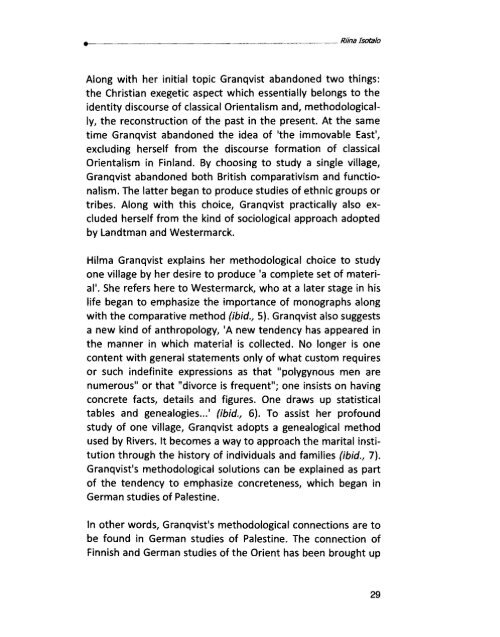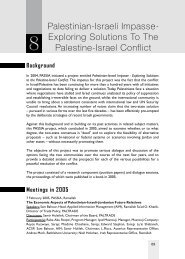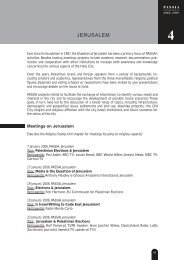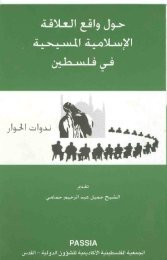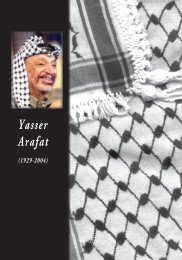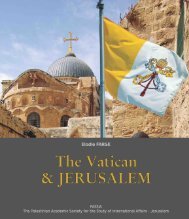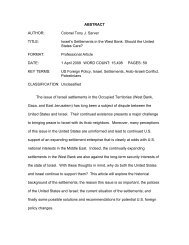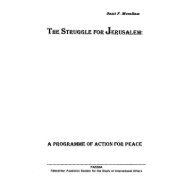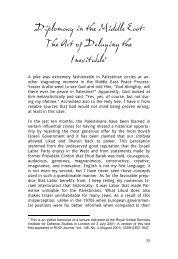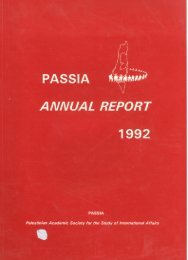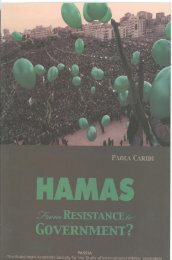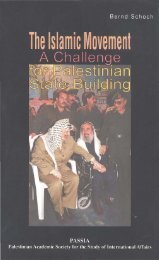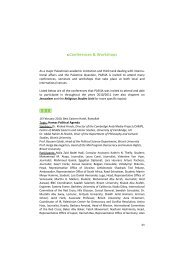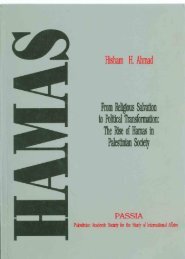FINLAND & PALESTINE Proceedings of a Joint Workshop
FINLAND & PALESTINE Proceedings of a Joint Workshop
FINLAND & PALESTINE Proceedings of a Joint Workshop
You also want an ePaper? Increase the reach of your titles
YUMPU automatically turns print PDFs into web optimized ePapers that Google loves.
•<br />
Along with her initial topic Granqvist abandoned two things:<br />
the Christian exegetic aspect which essentially belongs to the<br />
identity discourse <strong>of</strong> classical Orientalism and, methodologically,<br />
the reconstruction <strong>of</strong> the past in the present. At the same<br />
time Granqvist abandoned the idea <strong>of</strong> 'the immovable East',<br />
excluding herself from the discourse formation <strong>of</strong> classical<br />
Orientalism in Finland. By choosing to study a single village,<br />
Granqvist abandoned both British comparativism and functionalism.<br />
The latter began to produce studies <strong>of</strong> ethnic groups or<br />
tribes. Along with this choice, Granqvist practically also excluded<br />
herself from the kind <strong>of</strong> sociological approach adopted<br />
by landtman and Westermarck.<br />
Hilma Granqvist explains her methodological choice to study<br />
one village by her desire to produce 'a complete set <strong>of</strong> material'.<br />
She refers here to Westermarck, who at a later stage in his<br />
life began to emphasize the importance <strong>of</strong> monographs along<br />
with the comparative method (ibid., 5). Granqvist also suggests<br />
a new kind <strong>of</strong> anthropology, 'A new tendency has appeared in<br />
the manner in which material is collected. No longer is one<br />
content with general statements only <strong>of</strong> what custom requires<br />
or such indefinite expressions as that "polygynous men are<br />
numerous" or that "divorce is frequent"; one insists on having<br />
concrete facts, details and figures. One draws up statistical<br />
tables and genealogies...' (ibid., 6). To assist her pr<strong>of</strong>ound<br />
study <strong>of</strong> one village, Granqvist adopts a genealogical method<br />
used by Rivers. It becomes a way to approach the marital institution<br />
through the history <strong>of</strong> individuals and families (ibid., 7).<br />
Granqvist's methodological solutions can be explained as part<br />
<strong>of</strong> the tendency to emphasize concreteness, which began in<br />
German studies <strong>of</strong> Palestine.<br />
In other words, Granqvist's methodological connections are to<br />
be found in German studies <strong>of</strong> Palestine. The connection <strong>of</strong><br />
Finnish and German studies <strong>of</strong> the Orient has been brought up<br />
29


